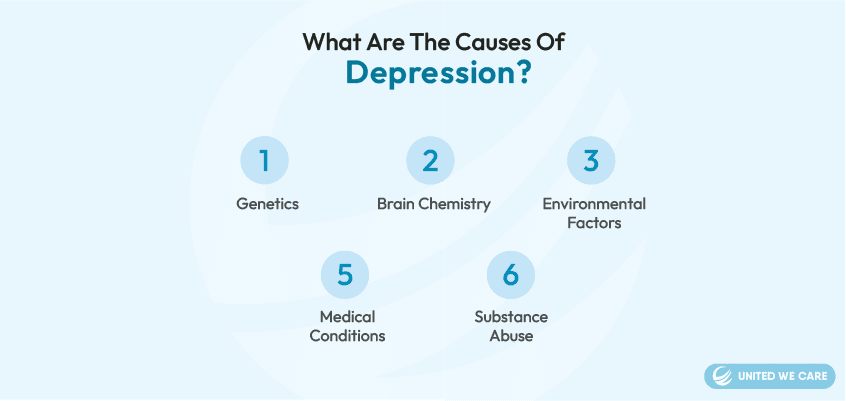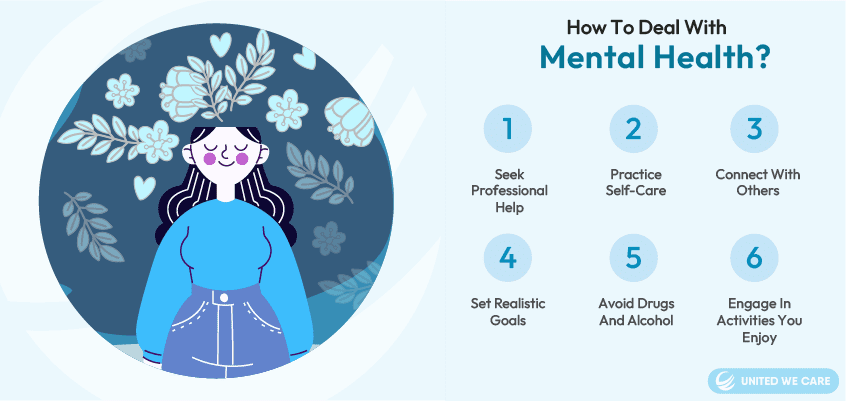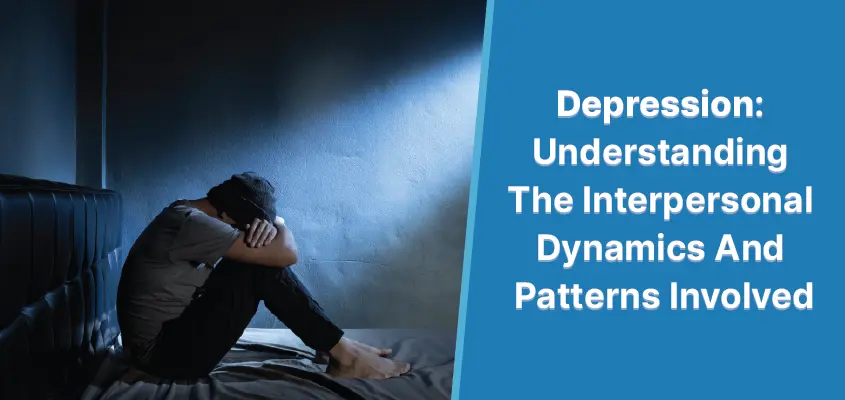Introduction
You might have come across a lot of people who constantly seem angry at everything. Then there might be people who are the light of a party but not the light of their own life. If you are one of these people, then you might be dealing with depression. Happiness can seem a far-fetched thought for you. There are a lot of factors that can impact and trigger symptoms of depression. In this article, I will be discussing the symptoms, reasons, and treatment plans. I hope you can find the help you need through this article.
“Depression is being color-blind and constantly told how colorful the world is.”- Atticus [1]
What is Depression?
You might have said or heard someone say, “My mood is off.” The mood is what you feel at a particular time. If you’re feeling sad and unwilling to do anything only at a particular time, it’s just a temporary phase. However, if these feelings last for two weeks or so, then that is called Depression.
Depression can be triggered at any time, at any age. In fact, we can get depression because of our childhood experiences, genes, family situations, physical conditions, etc. [2]
One very important thing that I learned as a psychologist is, “You are not your depression, and whatever your depression might be telling you, it’s mostly a lie.” Whatever the cause might be, depression is treatable. Telling you from a personal experience if I can overcome it, so can you. It just might take time, maybe more than me, maybe lesser than me. But, with the right changes in lifestyle and support, you can do anything.
What are the Symptoms of Depression?
Depression has become a common term that many of us use as a synonym for feeling sad. However, depression is much deeper. It is a mental health disorder that can affect how you think, what you feel, and even what you do. Some of the most common symptoms of depression, as per the Diagnostic and Statistical Manual of Mental Disorders, 5th edition (DSM-5), include: [3]
- Persistent feelings of emptiness, sadness, and hopelessness
- Loss of interest in once enjoyable activities
- Struggling to make decisions or concentrate
- Low energy, feelings of lethargy, and fatigue
- Changes in feelings of hunger, including weight loss or gain
- Disruptions in sleep patterns, such as lack of sleep or excessive sleeping
- Feelings of worthlessness or extreme guilt
- Frequent thoughts of death or suicide
For you to be diagnosed with depression, you must be experiencing five or more symptoms consistently for at least two weeks. But, it is important to get a formal diagnosis from a mental health professional rather than doing a self-analysis because, anyway, the extent of your symptoms can be different from someone else.
Read more about Mood disorder
What are the Causes of Depression?
Depression can get triggered at any time, at any age, and can impact how you think, what you feel, and even what you do. Some of the most common causes of depression include: [4]

- Genetics: Did you know that depression can travel from one generation to the other? That happens because the way we think can alter the DNA structure. So if any of your blood relatives had depression, it’s possible for you to have it as well.
- Brain Chemistry: There are certain chemicals in the brain, called neurotransmitters, like serotonin, dopamine, etc., that help us keep our mood in control. But did you know that it is possible for these chemicals to get imbalanced? This imbalance can cause depression.
- Environmental Factors: Our life experiences have a lot to do with what happens to our mental, physical, and emotional health. So, if you are someone who has seen or been through abuse, trauma, neglect, the death of a close relative, etc., then depression symptoms can get triggered.
- Medical Conditions: I’m sure that, like me, even you don’t like it when you’re unwell. The world is so gloomy when we’re unwell, isn’t it? So if you have illnesses like heart disease, diabetes, cancer, etc., you might be prone to developing depression.
- Substance Abuse: Most often, when we indulge too often in substances like alcohol and drugs, it is to fill a feeling of emptiness. So, it becomes a way to cope, but overusing it can make you slip deeper into depression.
Please remember that it is not important to focus on what causes depression because sometimes, there may not be an exact cause. It is more important to focus on how you can overcome feelings of sadness.
What is the Treatment for Depression?
Like most health concerns, depression can be treated. Since there is no one-size-fits-all treatment, some of the options you can go through are [5]:
- You can go through psychotherapy, like CBT, etc., with a trained psychologist.
- You can consult a psychiatrist, and they can suggest some anti-depressant medicines to regulate your mood and manage the symptoms of depression.
- You can change your lifestyle habit like sleeping on time, eating healthy, practicing yoga and meditation, etc.
- Your doctor can suggest therapies using magnetic stimulation (TMS) or electric currents (ECT) if you have a severe depression condition.
How to Deal with Depression?
Dealing with depression was one of the hardest things I have ever done. But because I was able to overcome, so can you. Here’s what I did, and you can try [6]:

- Seek Professional Help: One of the best things I realized was that I don’t have to deal with everything on my own. If there are people who can help me, then I will take all the help I can get. So I started with therapy with a trained psychologist.
- Practice Self-Care: Along with therapy, I decided I needed to give myself a bit of a break every day. So I indulged in self-care activities. I made sure I got enough sleep and had a healthy diet. In fact, I also started practicing yoga, meditation, and breath control exercises.
- Connect With Others: I decided that I needed people around me. I started meeting friends more often. My family planned weekend getaways every few weeks. I even joined a support group where I met more people dealing with depression and some who were able to overcome it all. I got so much strength from them that I was able to help myself better.
- Set Realistic Goals: I have always been a big planner. So, I decided to take it one day at a time. My therapist helped me set realistic and achievable goals. As I continued ticking small, everyday goals, I started having a sense of purpose and accomplishment. That helped me know my worth better.
- Avoid Drugs And Alcohol: I never was someone to use drugs or alcohol. But if you are someone who uses them, it’s better to avoid them as they can worsen your symptoms, and you can even become addicted to these substances.
- Engage In Activities You Enjoy: I even pushed myself and picked up painting, one of my hobbies. I also started taking dance classes. Not only did I enjoy the process of engaging in activities I liked, but I felt my mood also improve.
Must Read How to find effective depression therapist
Conclusion
Dealing with depression was one of the most challenging events that I went through. So, I know that it can bring your quality of life quite low. Even I, most days, didn’t have the energy to do anything. But with the support of friends, family, and mental health professionals, I was able to overcome the symptoms of depression. You don’t have to deal with everything on your own. So take all the help you get and need. Just don’t allow yourself to slip deeper and deeper into the quicksand called ‘depression.’
If you are experiencing any symptoms of depression, consult mental health experts at United We Care! At United We Care, a team of wellness and mental health experts will guide you with the best methods for well-being.
References
[1] “A quote from Love Her Wild,” Quote by Atticus Poetry: “Depression is being colorblind and constantly t…” https://www.goodreads.com/quotes/8373709-depression-is-being-colorblind-and-constantly-told-how-colorful-the
[2] “Depression,” National Institute of Mental Health (NIMH). https://www.nimh.nih.gov/health/topics/depression/index.shtml
[3] American Psychiatric Association, “Diagnostic and Statistical Manual of Mental Disorders,” May 2013, Published, doi: 10.1176/app.books.9780890425596.
[4] “What causes depression? – Harvard Health,” Harvard Health, Jun. 09, 2009. https://www.health.harvard.edu/mind-and-mood/what-causes-depression
[5] “Depression (major depressive disorder) – Diagnosis and treatment – Mayo Clinic,” Depression (major depressive disorder) – Diagnosis and treatment – Mayo Clinic, Oct. 14, 2022. https://www.mayoclinic.org/diseases-conditions/depression/diagnosis-treatment/drc-20356013
[6] “Depression | NAMI: National Alliance on Mental Illness,” Depression | NAMI: National Alliance on Mental Illness. https://www.nami.org/About-Mental-Illness/Mental-Health-Conditions/Depression











